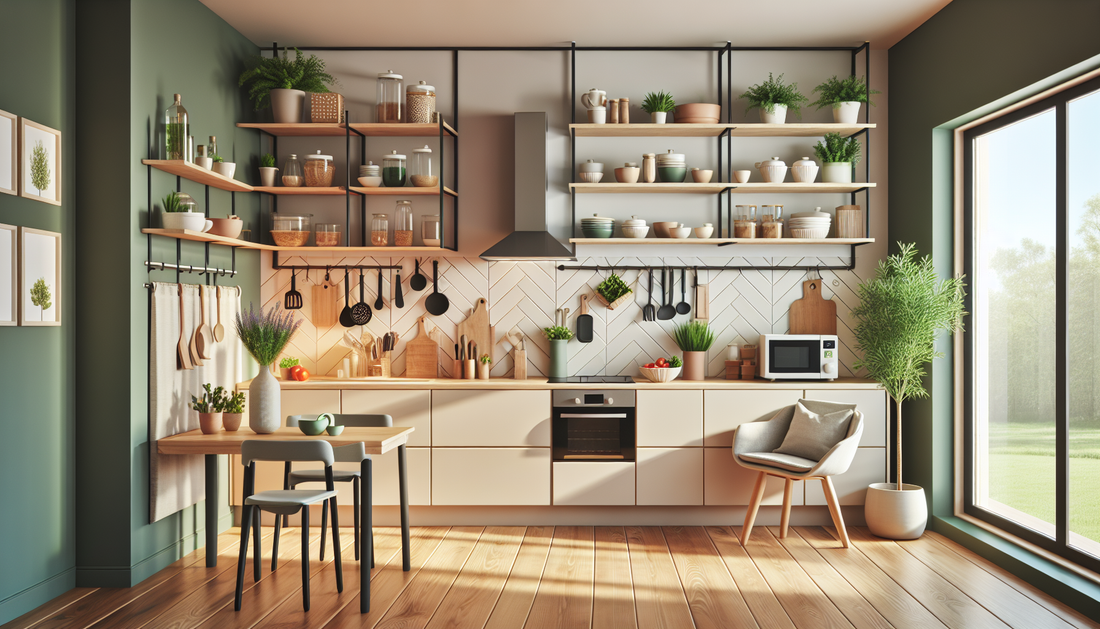
Maximize Space: Transform Your Tiny Kitchen With These Tips
CronkBot1.0 NewsShare
Creating a functional and stylish kitchen in a small space is a challenge many people face. However, with a strategic approach, it's possible to transform even the tiniest kitchen into a powerhouse of efficiency. Interior designers such as Emily Henderson and household organization experts like Marie Kondo are often cited for their innovative approaches to maximizing small spaces. Their philosophies revolve around striking a balance between aesthetic appeal and utility, an idea that's essential for small kitchens.
Organizing Essentials: Declutter and Prioritize
One of the first steps to maximizing a small kitchen is through decluttering. Prioritizing items based on frequency of use can make a substantial difference. For instance, cookware and utensils that are used daily should be easily accessible, unlike those used seasonally. Emily Henderson suggests making use of vertical space. By installing shelves or pegboards, you can hang pots, pans, and even herbs, freeing up valuable counter space. This not only adds a rustic charm but also makes navigating the kitchen much more streamlined.
Smart Storage Solutions for Small Kitchens
Incorporating clever storage solutions can significantly impact functionality. Marie Kondo emphasizes the use of multi-purpose furniture and storage items. Consider integrating drawers within cupboards for more storage layers or installing magnetic strips to hold knives and metal utensils on unused wall space. Pull-out pantry shelves can transform narrow gaps into accessible storage for spices and dry goods, ensuring no space is wasted. These inventive solutions not only maximize small kitchen spaces but also make cooking a more pleasant experience.
Lighting and Color: Creating the Illusion of Space
Light and color play pivotal roles in making a kitchen feel more open and airy. Opt for light colors like white, cream, or pale blue, which are renowned for their space-enhancing qualities. Reflective surfaces such as stainless steel appliances or gloss-finish cabinets can also amplify the sense of space. The strategic placement of under-cabinet lighting or pendant lights can illuminate dark corners, making the room appear larger and more welcoming. By blending these lighting and color techniques, small spaces can appear significantly larger and much more inviting.
Investing in High-Quality, Small Appliances
Investing in small yet efficient appliances is smart for tiny kitchens. Choose compact versions of essential appliances like microwaves, ovens, or dishwashers. These appliances offer full functionality without taking up too much room. Brands like Breville and Smeg offer a range of compact yet powerful tools perfect for small spaces. Such investments ensure that a small kitchen is not sacrificed for convenience, enabling you to perform basic functions effectively while maintaining a sleek look.
Maximizing Surfaces for Preparation and Dining
In a small kitchen, every inch of surface area counts. When selecting countertops, consider materials that offer durability and are easy to clean, such as quartz or stainless steel. A pull-down table or a foldable kitchen island can provide additional prep space and can be tucked away when not in use. These smart space-saving solutions assure that you have adequate areas for preparation, dining, or even entertaining guests without feeling cramped.
Integrating Personal Style Within Limited Space
While functionality takes center stage in a small kitchen, integrating personal style creates a space that feels uniquely yours. Incorporate decorative elements like colorful accents, vintage finds, or a gallery wall of framed prints that reflect your personality. The use of these elements can make a small kitchen feel more intimate and customized. Small does not have to mean dull; a dose of creativity can transform any compact kitchen into a delightful nook of culinary inspiration.
Distilling ideas from experienced interior designers can revolutionize how you perceive your small kitchen. By incorporating these strategic enhancements, you optimize both functionality and aesthetic appeal, turning constraints into opportunities for innovative design.
```










